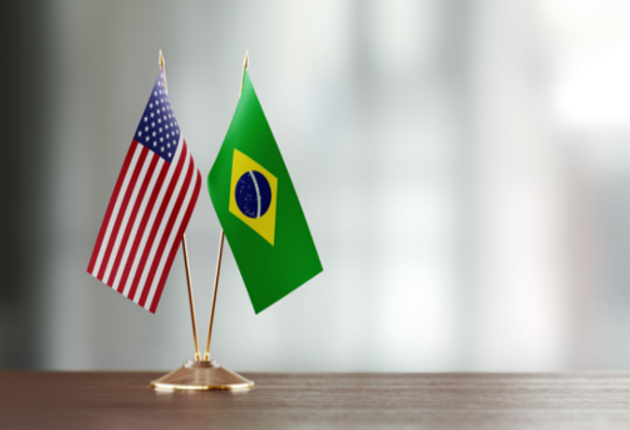The signing of a free trade agreement with the United States would be a great step for the advancement of Brazilian foreign trade and the whole of Mercosur. In the specific case of Brazil, in addition to significantly increasing the flow of Brazilian foreign trade, it could generate a growth of US $ 38 million in the national Gross Domestic Product (GDP). Another important result of this agreement, which will certainly be considered one of the priorities not only for the Brazilian government but also for the other Merosul member countries, will be an appreciable increase in the trade balance with the Americans, which in the Brazilian case has been stagnating for over 10 years, around US $ 28 billion.
Among other positive points, an agreement between Mercosur and the US will give ordinary citizens and companies easier access to high-tech products and markets such as e-commerce, cosmetics and distance education would have significant advances. In the case of Brazil, an increase is expected in exports of typically Brazilian products. In summary, signing this agreement would increase the flow of trade in goods and services with the United States and would allow Brazil to further expand the share of industrialized products in exports to the American market.
These are some of the main results to be obtained by Brazil and also by Argentina, Paraguay and Uruguay, should Mercosur be able to sign a free trade agreement with the greatest economic potency of the planet. Further details on the subject can be found below in the exclusive interview of Thomson Reuters Foreign Trade Analyst Ângela Maria dos Santos to Comexdobrasil.com:
1) Is the Mercosur and US agreement feasible?
A: Without a doubt. Brazil, as well as its Mercosur partners, is experiencing a moment of transformation, working on significant advances and modernizations for the bloc. On the Brazilian side, participation in world trade is not very significant, not reaching 2% compared to its neighbors and developed countries, the result of a closed and protectionist economy. However, the agreement between Mercosur and the European Union demonstrates a watershed for world trade and especially for Mercosur, which will continue to focus on reassigning this condition, continuing to open up the market with new partners and thus increase the opportunities for businesses with substantial savings. The US is currently the largest economic power and the trade relationship, especially with Brazil, does not come from today. Brazil was in 2018 the 9th largest US goods export market and the 17th largest supplier of US goods imports.
2) What can this agreement entail for Brazilian foreign trade? How would Mercosur and Brazil’s trade relations, mainly, change with the US?
A: First of all, one must look at the prism of the strong protectionism also imposed by the US, especially on Brazilian products, due to years of commercial divergence. There was never a trade agreement between the parties, which was always prevented by the previous governments, mainly the Brazilian, on the grounds that an agreement with the US would weaken the Mercosur bloc.
As a result, both the US and Mercosur have begun to retaliate against the marketing of certain products such as steel, ethanol and agricultural products through high-rate and non-tariff barriers. However, the current Brazilian and Argentine governments, with different visions of the previous ones, put aside ideological biases and are seeking to establish agreements that in fact bring economic prosperity to Mercosur. Therefore, we understand that a free trade agreement between Mercosur and the US would be a great step for the advancement of Brazilian foreign trade, as well as Mercosur.
The viability of this agreement would boost an already significant flow of trade, not only of products, but of services and investments between the parties. We can see from the numbers of 2018, in which the trade of US goods and services with Brazil totaled US $ 103.9 billion. Exports were $ 66.4 billion and imports of $ 37.5 billion. The US trade surplus with US goods and services was US $ 28.9 billion.
Brazil is currently the 13th largest US trading partner of goods, with $ 70.7 billion in total (import / export) trade in goods during 2018. Exports totaled $ 39.5 billion and imports $ 31 , 2 billion. The trade surplus of US goods with Brazil was US $ 8.3 billion in 2018.
In terms of service sector, exports and imports totaled US $ 33.2 billion in 2018. Exports of services totaled US $ 26.9 billion and imports of services totaled US $ 6.3 billion. The US trade surplus with Brazil was US $ 20.6 billion in 2018.
After the inauguration of the current president, talks with the president of the United States were started on a possible agreement, but at the time only between the two countries, which would make an agreement impossible. On account of Mercosur, Brazil could only advance the negotiations en bloc and, for the other members, the moment was not propitious. However, this scenario changed with the approaching conclusion of the agreement between Mercosur and EU, when the talks continued to be led by the presidents of Brazil and Argentina.
The perception of the implications and possible changes, it is clear that for each agreement there are particularities in the negotiations, however the themes would be similar to those discussed with the EU, such as agriculture, since the US subsidizes local agriculture, high taxes on industrial products, steel and aluminum, as well as questions on protection of intellectual property rights, among others. The US uses arguments about non-tariff barriers and high rates on the Brazilian side, for example in relation to coal and semi-finished products. Considering these points and the parties achieving alignment, would be an agreement with advantages for both. To get an idea, data from 2016 revealed that US GDP could increase by US $ 24 billion and Brazil by US $ 38 billion.
3) What can you expect from such an agreement? What can he bring of news? Can it collaborate to expand the export agenda of Brazil and Mercosur to the US?
A: We can expect at least a considerable boost in the economy, helping both Brazil and the other members of Mercosur to combat the high costs of living, given that, taking into account the elimination of protectionist barriers, there would be an easy access to American products and would stimulate exports of Brazilian products. As it was with the EU, this will not be a simple agreement. There is a lot of counter pressure and complex guidelines to make the benefits for the parties real. In this way all points need to be well adjusted.
As we have seen, the strong commercial and cooperation relationship between the parties already exists. In 2017, the US reached a GDP with Brazil of US $ 2.1 trillion (current market exchange rates). Real GDP rose by 1.0% and the population was 208 million, according to IMF data.
Thus, it is possible to perceive that there is space for this relationship with an agreement to be more consistent. Not only by eliminating tariff and non-tariff barriers, but by facilitating access to markets involved in the areas of technology, education, investments and, consequently, bring gains in the development of citizens. In addition, we understand that the main novelty would be the increase in trade between the parties that has been stagnating for at least 10 years, at around US $ 28 billion, despite having increased considerably due to the US-China trade war , when Brazil exported more to China.
The prospect is that there is an increase in exports from Brazil and Mercosur to the US, especially in relation to the products with more competitive possibilities like sugar, cotton, fresh beef, ethanol, aluminum, soy, etc.
As mentioned, among the innovations that may arise beyond those already mentioned in relation to trade in goods, will be the deepening of ties between people through cooperation in the areas of exchanges in education, energy, health, agriculture, science and technology, security, services and innovation.
Since the visit of the current president of Brazil to Washington in March 2019, where cooperation agreements were signed, and with the conclusion of the Mercosur and EU agreement, the talks, mainly with Brazil and Argentina and, of course, being extended to others members of Mercosur, will be accelerated, and an agreement between Mercosur and the US is closer than far from happening.
4) What is the view of Thomson Reuters about the agreement for Brazilian Foreign Trade? What are the positives and negatives?
A: Thomson Reuters is a champion of international agreements, especially those that provide the growth and development of businesses and, consequently, the economy. International agreements provide for market opening, visibility of our products, increase exports, develop industrial sectors, stimulate the modernization of companies, generate jobs, etc.
Our opinion is the same as what we concluded for the EU agreement, that is, we have much more to gain than to lose. An agreement between Mercosur and the US will provide ordinary citizens and companies with easier access to high technology products and markets such as e-commerce, cosmetics and distance education would have significant advances. In the case of Brazil, an increase is expected in exports of typically Brazilian products. These data are shown in material prepared by MRE (Ministry of Foreign Affairs) – Challenges and Opportunities for the Export of Brazilian Products to the United States https://bit.ly/2xKTCny.
And as mentioned earlier, with the elimination of tariff and non-tariff barriers, it would take the trade balance to higher levels, coming out of the stagnation that we have lived for more than a decade.
From the point of view of Thomson Reuters, considering that the content of the possible agreement between Mercosur and the US has not yet been disclosed, we can say, in a macro way, some worrying and not negative points. For example, what would be the commercial relationship between Brazil and China, that with the implementation of this agreement, could cause a distance between them? China, like the US, is an important partner of Brazil, both in the trade agenda and the investments that it maintains here and that has been gradually increasing.
Brazilian exports to China were more than double in 2018 than in the US, when exports were US $ 64.2 billion, a 35% increase compared to 2017, with a surplus of US $ 29.4 billion in the trade balance .
However, Brazil’s sales to the Chinese are far less diversified than with the US. However, the Brazilian government and the members of Mercosur will seek ways that, when signing an agreement with the US, will not damage its relationship with China, considering the commercial war they both maintain and the possible pressure that will come from the United States. The Brazilian government understands that China is an important partner and will prepare for future talks with the Chinese for a possible bilateral agreement.
Another point that we highlight as worrying is how much companies are or are not prepared to enjoy this type of agreement. In this way, those located in Mercosur, especially those in Brazil, seek to be prepared, in addition to meeting the advances of government systems, also seek to modernize themselves technologically, with integration software to assist the use of both international agreements and of special schemes, which provide significant operational and financial gains, making their products more competitive. That is, it is no use having an agreement of this magnitude and not being prepared to use it.
5) What can the agreement add to the Mercosur countries?
A: We are experiencing a historic moment since the creation of Mercosur, which for a long time witnessed serious trade divergences within the bloc that destabilized and undercut all credibility in the eyes of other markets, especially the great powers. Now, we have seen the bloc working hard together with one goal, advancing their economies as well as valuing what they have to offer best to their trading partners with Mercosur. So when we talk about modernity, advanced technology and access to the best products, the US are the most cited. An agreement with this economic powerhouse, as long as they minutely aligned the points to ensure there are no losses to the local markets, can only add. Particularly in the development of our companies and public systems, since for our products to enter such a demanding market, they must at least be at competitive levels with theirs.
6) What is the perspective of the commercial relationship between the two blocs after the announcement of the agreement and when it is put into practice?
A: As it was with the EU, the conclusion of this agreement will be a milestone for Brazil and its Mercosur partners. Leaving aside political affinities or disagreements, the objective between the parties is to provide growth and development for their economies. The expectation is that there will be, in addition to an increase in exports of the main products exported to the US, that Brazil, as well as other members of Mercosur, will take advantage of this facilitation in accessing the US market and thus modernize their production lines, international agreements, generate new jobs, etc. And on the government side, take advantage of US support for biodiversity conservation in the Amazon and also for Brazil to join the Organization for Economic Cooperation and Development (OECD). The consequence will be a much more consistent and attractive economy, including the dynamism of new partnerships with other relevant economies.
Source: Comex do Brasil / Thomas Reuter







